 |
||||||||||||||||
| Click on images to read caption-story and to see a large version. |
||||||||||||||||
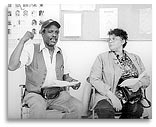 |
||||||||||||||||
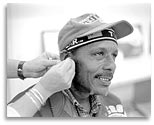 |
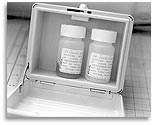 |
|||||||||||||||
| This documentary focuses on Gene Hartman Jr., 51, of San Francisco, California, who is recovering from a 30-year battle with heroin.
Before Gene turned 20, he fought in the Vietnam War. He started using marijuana at that time. He got paranoid because of the marijuana effect, so he started using heroin since 1972, when returning home from the war. Trying to avoid heroin addiction, Gene, who likes the outdoors decided to work as a maid at a hotel in Yosemite National Park. Because not many African Americans worked up there, Gene and his friends began going to Fresno, where other African Americans lived. What Gene found in Fresno, unfortunately, was a drug connection. Prior to this incident, Gene had not used heroin for some years. After quitting the job in Yosemite, he became a carpenter back in San Francisco, since he liked to make things with his hands. Twenty years later, he quit this job because of his terrible back pain, while still struggling in a maze of heroin addiction. Three years ago, however, realizing he couldn't lead his life with heroin addiction any more, he made up his mind to quit. Since then, he has been recovering by having acupuncture and taking "methadone" a legal liquid substance used in replacement treatment programs for heroin addicts. He also quit drinking for two years after he found out that he had Hepatitis C. Gene now leads a busy life, participating in three outpatient programs for African Americans in recovery. Although he thinks methadone is harder to quit than heroin, he said, “I’m trying to be off next year. That’s my goal.” The outpatient programs -- They offer drug or alcohol rehabilitation, mental health treatment, HIV/AIDS support services, and education in recovery. In many cases, the programs are managed by non-profit organizations.Methadone -- It’s a legal liquid substance used in replacement treatment programs for heroin addicts. It prevents clients from transmitting diseases which occur by the usage of dirty needles, but it has some possible side effects, such as sedation, drowsiness, nausea, sweating and decreased blood pressure. Clients are obligated to receive methadone under strict supervision and close monitoring. The final goal for clients is to overcome drug addiction by decreasing the amount of methadone. Afterword -- What made me decide to shoot Gene for a documentary was that I observed the needle exchange program for the narcotics, which is located in the workplace of a friend of mine, Randy Campbell, who is a health educator. In this program, injecting drug users can exchange an old needle or syringe for a new one, to prevent secondary infection of diseases such as HIV or Hepatitis C caused by exchange of dirty needles between drug users. It's a controversial issue because some say this program ends up encouraging drug addiction. Campbell was Gene's counselor, and he introduced me to Gene. Campbell thought Gene, a recovering client, would be an appropriate subject. Through a couple of interviews, I was impressed that Gene has such a positive attitude in pursuing a better life, although he had experience such things as heroin addiction, as the Vietnam War -- which are beyond my imagination. I thought that he is a very sociable person when I saw him greeting his friends with a smile, one after another. During our walk, I was worried that my awkward, quiet character might cause a lack of communication, but he always broke the ice, and made me feel comfortable speaking. Through the documentary project, it was worth learning all the facts, and I also appreciated that I had such a good interaction with Gene. |
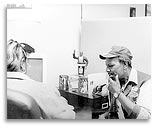 |
||||||||
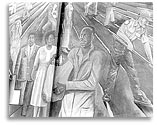 |
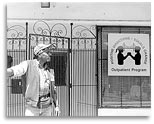 |
|||||||
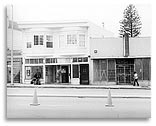 |
 |
|||||||
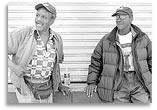 |
||||||||
|
|
||||||||
